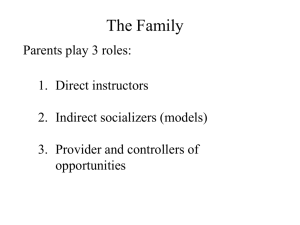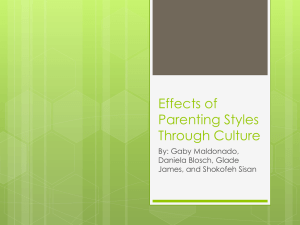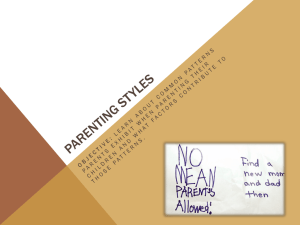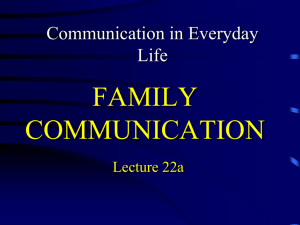Child Development Knowledge and Authoritative Parenting: Implications for Adolescent Mothers
advertisement
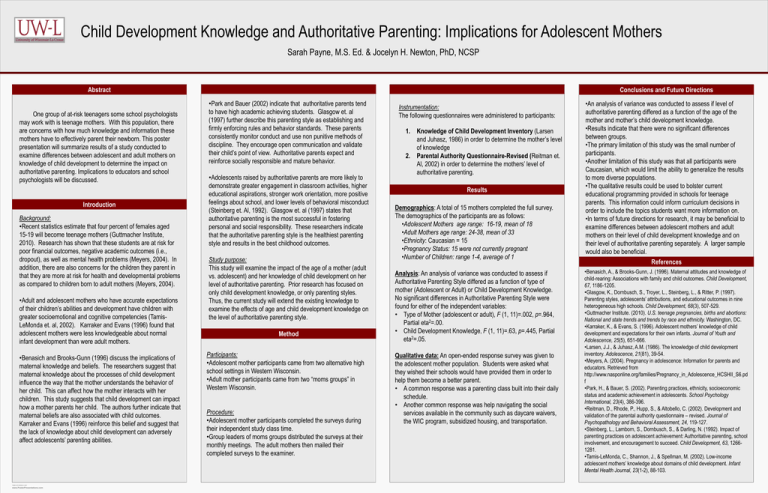
Child Development Knowledge and Authoritative Parenting: Implications for Adolescent Mothers Sarah Payne, M.S. Ed. & Jocelyn H. Newton, PhD, NCSP Abstract One group of at-risk teenagers some school psychologists may work with is teenage mothers. With this population, there are concerns with how much knowledge and information these mothers have to effectively parent their newborn. This poster presentation will summarize results of a study conducted to examine differences between adolescent and adult mothers on knowledge of child development to determine the impact on authoritative parenting. Implications to educators and school psychologists will be discussed. Introduction Background: •Recent statistics estimate that four percent of females aged 15-19 will become teenage mothers (Guttmacher Institute, 2010). Research has shown that these students are at risk for poor financial outcomes, negative academic outcomes (i.e., dropout), as well as mental health problems (Meyers, 2004). In addition, there are also concerns for the children they parent in that they are more at risk for health and developmental problems as compared to children born to adult mothers (Meyers, 2004). •Adult and adolescent mothers who have accurate expectations of their children’s abilities and development have children with greater socioemotional and cognitive competencies (TamisLeMonda et. al, 2002). Karraker and Evans (1996) found that adolescent mothers were less knowledgeable about normal infant development than were adult mothers. •Benasich and Brooks-Gunn (1996) discuss the implications of maternal knowledge and beliefs. The researchers suggest that maternal knowledge about the processes of child development influence the way that the mother understands the behavior of her child. This can affect how the mother interacts with her children. This study suggests that child development can impact how a mother parents her child. The authors further indicate that maternal beliefs are also associated with child outcomes. Karraker and Evans (1996) reinforce this belief and suggest that the lack of knowledge about child development can adversely affect adolescents’ parenting abilities. TEMPLATE DESIGN © 2007 www.PosterPresentations.com Conclusions and Future Directions •Park and Bauer (2002) indicate that authoritative parents tend to have high academic achieving students. Glasgow et. al (1997) further describe this parenting style as establishing and firmly enforcing rules and behavior standards. These parents consistently monitor conduct and use non punitive methods of discipline. They encourage open communication and validate their child’s point of view. Authoritative parents expect and reinforce socially responsible and mature behavior. •Adolescents raised by authoritative parents are more likely to demonstrate greater engagement in classroom activities, higher educational aspirations, stronger work orientation, more positive feelings about school, and lower levels of behavioral misconduct (Steinberg et. Al, 1992). Glasgow et. al (1997) states that authoritative parenting is the most successful in fostering personal and social responsibility. These researchers indicate that the authoritative parenting style is the healthiest parenting style and results in the best childhood outcomes. Study purpose: This study will examine the impact of the age of a mother (adult vs. adolescent) and her knowledge of child development on her level of authoritative parenting. Prior research has focused on only child development knowledge, or only parenting styles. Thus, the current study will extend the existing knowledge to examine the effects of age and child development knowledge on the level of authoritative parenting style. Method Participants: •Adolescent mother participants came from two alternative high school settings in Western Wisconsin. •Adult mother participants came from two “moms groups” in Western Wisconsin. Procedure: •Adolescent mother participants completed the surveys during their independent study class time. •Group leaders of moms groups distributed the surveys at their monthly meetings. The adult mothers then mailed their completed surveys to the examiner. Instrumentation: The following questionnaires were administered to participants: 1. Knowledge of Child Development Inventory (Larsen and Juhasz, 1986) in order to determine the mother’s level of knowledge 2. Parental Authority Questionnaire-Revised (Reitman et. Al, 2002) in order to determine the mothers’ level of authoritative parenting. Results Demographics: A total of 15 mothers completed the full survey. The demographics of the participants are as follows: •Adolescent Mothers age range: 16-19, mean of 18 •Adult Mothers age range: 24-38, mean of 33 •Ethnicity: Caucasian = 15 •Pregnancy Status: 15 were not currently pregnant •Number of Children: range 1-4, average of 1 Analysis: An analysis of variance was conducted to assess if Authoritative Parenting Style differed as a function of type of mother (Adolescent or Adult) or Child Development Knowledge. No significant differences in Authoritative Parenting Style were found for either of the independent variables: • Type of Mother (adolescent or adult), F (1, 11)=.002, p=.964, Partial eta2=.00. • Child Development Knowledge, F (1, 11)=.63, p=.445, Partial eta2=.05. Qualitative data: An open-ended response survey was given to the adolescent mother population. Students were asked what they wished their schools would have provided them in order to help them become a better parent. • A common response was a parenting class built into their daily schedule. • Another common response was help navigating the social services available in the community such as daycare waivers, the WIC program, subsidized housing, and transportation. •An analysis of variance was conducted to assess if level of authoritative parenting differed as a function of the age of the mother and mother’s child development knowledge. •Results indicate that there were no significant differences between groups. •The primary limitation of this study was the small number of participants. •Another limitation of this study was that all participants were Caucasian, which would limit the ability to generalize the results to more diverse populations. •The qualitative results could be used to bolster current educational programming provided in schools for teenage parents. This information could inform curriculum decisions in order to include the topics students want more information on. •In terms of future directions for research, it may be beneficial to examine differences between adolescent mothers and adult mothers on their level of child development knowledge and on their level of authoritative parenting separately. A larger sample would also be beneficial. References •Benasich, A., & Brooks-Gunn, J. (1996). Maternal attitudes and knowledge of child-rearing: Associations with family and child outcomes. Child Development, 67, 1186-1205. •Glasgow, K., Dornbusch, S., Troyer, L., Steinberg, L., & Ritter, P. (1997). Parenting styles, adolescents’ attributions, and educational outcomes in nine heterogeneous high schools. Child Development, 68(3), 507-529. •Guttmacher Institute. (2010). U.S. teenage pregnancies, births and abortions: National and state trends and trends by race and ethnicity. Washington, DC. •Karraker, K., & Evans, S. (1996). Adolescent mothers’ knowledge of child development and expectations for their own infants. Journal of Youth and Adolescence, 25(5), 651-666. •Larsen, J.J., & Juhasz, A.M. (1986). The knowledge of child development inventory. Adolescence, 21(81), 39-54. •Meyers, A. (2004). Pregnancy in adolescence: Information for parents and educators. Retrieved from http://www.nasponline.org/families/Pregnancy_in_Adolescence_HCSHII_S6.pd f •Park, H., & Bauer, S. (2002). Parenting practices, ethnicity, socioeconomic status and academic achievement in adolescents. School Psychology International, 23(4), 386-396. •Reitman, D., Rhode, P., Hupp, S., & Altobello, C. (2002). Development and validation of the parental authority questionnaire – revised. Journal of Psychopathology and Behavioral Assessment, 24, 119-127. •Steinberg, L., Lamborn, S., Dornbusch, S., & Darling, N. (1992). Impact of parenting practices on adolescent achievement: Authoritative parenting, school involvement, and encouragement to succeed. Child Development, 63, 12661281. •Tamis-LeMonda, C., Shannon, J., & Spellman, M. (2002). Low-income adolescent mothers’ knowledge about domains of child development. Infant Mental Health Journal, 23(1-2), 88-103.
